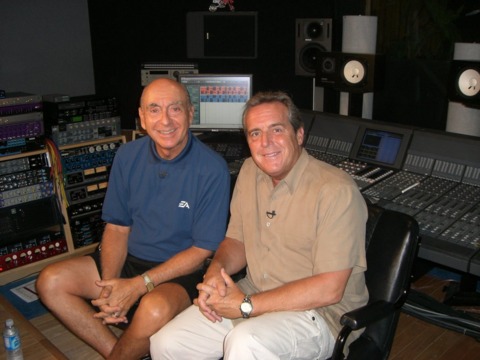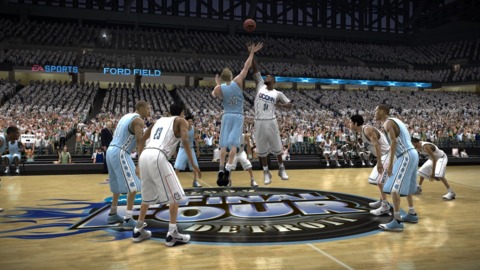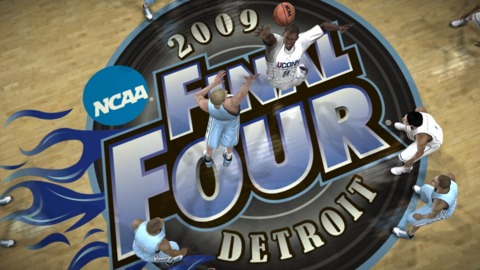Talking Hoops With Mr. Vitale
Before I began my interview with Dick Vitale, I thought that I'd have to transcribe half the interview in all capital letters. This is the guy, after all, who coined phrases like "SLAP A LAPPER NAPPER!" and "DIAPER DANDY!" as well as ending every other sentence with "BABY!" I figured Dick would be...
Before I began my interview with Dick Vitale, I thought that I'd have to transcribe half the interview in all capital letters. This is the guy, after all, who coined phrases like "SLAP A LAPPER NAPPER!" and "DIAPER DANDY!" as well as ending every other sentence with "BABY!" I figured Dick would be the same maniacally energetic personality in a phone interview that he is on TV. It's not exactly the case. While Dick's love of basketball (and all sports) shines through at all times, it seems Dickie-V looks to save his energy for game-time. In celebration of today's release of the download-only NCAA Basketball 09: March Madness Edition today on Xbox Live, and Selection Sunday this coming weekend, here's my recent conversation with Dickie-V, touching on his playing, coaching, and broadcast career, and his involvement with the EA Sports college hoops series.

Dick Vitale with his announcing partner in crime, Brad Nessler.
GameSpot: I know that you have, obviously, some coaching experience and a lot of broadcasting experience. But I'm wondering if you can tell me about your playing days.
Dick Vitale: You know, I was a marginal player at best. I had no speed, I had no quickness, couldn't defend anybody. I like to think I could shoot the ball. But I played some high school basketball, very limited, like a Division2 college level. I played at Seton Hall Paterson Division, played a year or two. But I put all my time, really, in trying to go to clinics, learn about the game and then coached on the junior high level, the high school level, the collegiate level, the professional level. And then went to television, where for 30 years I got the best record in America, because we'd never lose a game, man. I've won over a thousand games.
GS: So the fact that you considered yourself a marginal player, it didn't diminish your love for the sport at all?
DV: Oh, absolutely not. I lost my eye as a kid and I was, like, a one-way player, you know? People would say, "Well, he can't go to his left, he can't see out of his left eye." But, no, I've always had a passion, love for sports, whether it be basketball, baseball, football. I just love sports. I've always been a guy that devours the sports pages, whether it be the statistics in baseball or basketball or whatever. And I've just been a sports lover and I just happened to put my attention toward coaching on a basketball level.
GS: In your early coaching days, did you have a role model that you wanted to pattern your program after?
DV: You know, you emulate or try to follow those that do it really well and to try to study those that were exceptional. Obviously down at UCLA they were the best of the best. John Wooden, the Wizard of Westwood and you watched what Bob Knight was doing certainly at West Point and then Indiana. You'd sit there, go to clinics and try to study and analyze and learn from the best. And that's what I tried to do. And then incorporate their ideas into your system, and maybe utilize your energy and personality, try and get the most out of people and go from there.
GS: And moving on to broadcasting, who was it that gave you your big break and how did that come about?
DV: My big break happened, actually, when I was at the University of Detroit coaching. We played Michigan in, I guess, round 16, and the game ended up being televised by NBC regionally. And the producer and executive producer was Scotty Connal. And John Wooden did the game as an analyst, with Curt Gowdy as the play-by-play guy. And I was in my awe to think they would be doing one of my games. And we played Michigan, who was number one in the nation. And we were really good that year, but we played them into an incredible David and Goliath situation, where they beat us in, like, the last minute.
And that was the end of our season. We had a great, great season. We had beaten champs that year, Marquette, in Milwaukee during the regular season, we won 21 in a row. But I went on from there to coach in the NBA. And when I got fired in the NBA on November8, 1979, when I got fired, the phone rang a week or two weeks later. And I got a call from a fellow by the name of Scotty Connal. And he said, "You don't know me, but I produced your last game. I heard you speak to your team at practice, wrote your name down. I said that if I ever had a chance I wanted to give you an opportunity. Well, I've just been named the head of a new network, it's called ESPN. And our first game is going to be Wisconsin... in terms of national college basketball and I would like you to do it." And I said, "No, I have no television and I could care less. I want to coach in college."
And he called me back again, and I'm lucky he did. And 30 years later, it's led me to--as I shared this story at the induction when I was inducted into the National Basketball Hall of Fame last year as a contributor to the game, I shared this story about how it all started. Little did I know at that moment that it would change my life. And it did.
GS: You've become such an icon in the sport and you've become very confident on the mike and on camera. How do you look back at your early days of broadcasting compared to where you are now?
DV: Well, you know, you just think about the fact that--I had no clue, man. People talking in your ear, it's not as easy as people say. You have no idea what's going on. People just give you a microphone, you come out of a locker room. Fortunately for me, in those days, they didn't have critics out there like they do now, criticizing or evaluating every little word. I mean, you got a chance to grow. Today, I mean, a young guy comes out and if he doesn't do it right away, he's gone. There's another new guy coming on the block.
I'm proud of the fact of being able to--with the same network--survive 30 years. Today's day and age, that's very rare because it's such a subjective scenario that we're in. I mean, it's a matter of opinion. One guy likes one style, another guy likes another style. A new president gets hired, he fires and brings his own guys in. I've been able to get through all of that, you know, changes in administration, changes in my bosses, and I've been able to stay and continue. And I'm very proud of that in my career.
And I think the one thing I've always tried to bring--and I'm never going to be someone that people are always going to agree with what you say, because they're just not going to. That's just the nature of the business. But the one thing I would like people to all agree is that they can't deny that every telecast I put my heart and soul in it, and do it with a passion and love for the game, and a love for what I'm doing. And that's always been a constant.
GS: I imagine there's a lot of travel, a lot of prep for you this time of year. What's a typical week for you like in late February/early March?
DV: Well, you know, you're obviously going out to do games. Tomorrow I go out to do Louisville, West Virginia. And next week the ACC Tournament. Then we get ready, Selection Show, and then the analysis we've got to do up in ESPN studios for the tournament, since we don't have the tournament. But, you know, saying all that, it's really--don't tell my bosses--it's stealing money, because you're doing something you love, it's not a job. My father and mother, they worked. They worked in a factory, they were uneducated [but had a doctorate in love] what they did for a living. And we've been very blessed. That's why I get so annoyed when I hear players and people moaning about how tough they have it. They have no clue. We're paid handsomely, we live a life that people go out of their way to treat us like royalty. So it's not tough at all.
But, you know, preparation, knowledge, studying the stats, that's the stuff that really takes some time and analyze--when I get off this call here I go to the Internet now and I start checking up on Louisville and on West Virginia to get ready for tomorrow's telecast. I mean, you just don't walk out there and spit off all these numbers and everything just by accident. I mean, you've got to really be prepared.
GS: You've covered the game for so long, you've been a coach. I'm curious as to your thoughts on the role of the coach on a college basketball team. In your mind, what's the most important thing a coach can impart to a college player, whether they're going to hit the NBA or not?
DV: Well, you know, I think communication of your concepts, to be able to get people to understand what you're trying to teach, whatever your system may be, I think it comes down to no matter what your system is, there's certain generic situations that occur if you're going to win. Number one, you better be able to understand shot selection. You better make certain that the right people are shooting the basketball. You better make sure that people communicate with one another defensively. You better make sure they understand you play defenses, five people in rhythm working together. I think all of those things are basic coaching situations that have to transpire if you want to win and if you're going to get to the winner's circle. I think all the Hall of Famers, the Mike Krzyzewskis, the Roy Williamses and guys like that, make sure that happens.
GS: Which up-and-coming coaches have impressed you lately?
DV: Oh, I think there's a great young coach when you look, for example, Xavier, Sean Miller. I think he's a kid that's got a great upside in future. I think you take a look at the kid at VCU, Virginia Commonwealth. You're hearing great things about Anthony Grant, who I got to know when he was on the staff at Florida. You take a look at what Thad Matta's doing, he's a young coach down there in Ohio State. I look at the young guy at Butler, [Brad] Stevens, a very young coach, and the amazing job he's doing. A first-year guy at Marquette, Buzz Williams, doing a solid job coming into a situation where they have talent, but getting that talent to blend. I think we'll always have some new, good, young guys. But there's so many good people on the sidelines, you know. I've always said there aren't bad coaches, there are bad players.

GS: Which sort of brings me to my next question. You know, in college basketball we see programs that are perennial winners and we see programs that perennially struggle year in and year out. I'm wondering why you think some programs inherently succeed year in and year out, if it's coaching, if it's recruiting. What's the formula, in your opinion?
DV: Well you just said the magical word, it's recruiting. I mean, obviously it's a domino effect. If you've got great recruits, you're going to have a chance to win, because most coaches understand--I think you break down coaching in three factors. Number one, you better have the ability to recruit. Number two, you better have the ability to communicate, whether it be with the media, with your alumni, with people, with your players, communication is so important. The third phase is obviously the technical strategy of handling a practice session and handling a game.
I think that certain schools, year in and year out, the perennial powers are there because, one, they have great visibility. I mean, just think about it now. If you were a great player--I'm going to let you dream for a moment--if you were a superstar player, and a Roy Williams or a Mike Krzyzewski, they come over and they try to recruit you, my God, you're on cloud nine. You're excited like you cannot believe. Yet, I walk in from the University of Detroit, I need 35 visits to get you to look up. You know, these guys, you're like, unbelievable. You want to get out the autograph book and get pictures, Jim Calhoun, Jim Boeheim. So all of those factors play a big part. So those schools have the great advantage of having programs that kids have been following since they've been little kids.
Then you've got--they play the EA Sports game, which I'm so proud to be part of, as you know, I'm with them as well. And I'm here because of them and the amazing job they've done with the latest technology, to really make the game so real, where you can actually have the coaches involved and the players. But the game is so special, college basketball is so special. And I'm so proud that EA Sports has really done a fantastic job duplicating that.
GS: So tell me about being in the video game. Can you describe that for us, about how that job is different from calling a game on the sidelines?
DV: Well, calling on the sidelines is a situation where you're seeing what's happening right there. Here, we're trying to make things happen that we have not really seen yet. But they do such a phenomenal job in putting it together. And Brad Nessler and I have so much fun when we're there doing it, and they allow us the freedom and flexibility, give us an idea and then allow us at times to be able to expand on that. And I just get amazed. I'm not really a guy technically really sharp, to be honest with you. But I get amazed year in and year out watching this. I've been involved with them for several years, and watching, like now, the game NCAA Basketball 2009 has gotten so much better and better because it's actually gotten to a situation where they really duplicate the excitement, the passion, the fan interest, the spirit, the cheerleaders, the whole bit. They make it so real and so genuine.
GS: Who do you like going in the conference championships, which teams should we keep our eyes on?
DV: The one thing I love about [conference championships]… it gives everybody that last chance to chase that dream. You know, people say, well, let's expand the tournament and get everybody in. Really, everybody is in. Other than the Ivy League, everybody is in because you have a conference championship where every team, the last place team, gets a chance to dream and the chance to make that magical moment happen possibly, and win the right of getting in the tournament. So from that standpoint, it creates a lot of excitement.
I hate to divert a little bit, I hope you can go to my website, dickvitaleonline.com and help me in quest of my goal of raising one million dollars for V Foundation for Cancer Research. We have the Dick Vitale Gala on May15, we're going to honor Rick Pitino and Billy Donovan. And if you go to my website, people can learn how they can do that because that disease affects all of us. And we're trying like heck to raise one million dollars.
GS: Thanks for your time, Dick.
Got a news tip or want to contact us directly? Email news@gamespot.com
Join the conversation